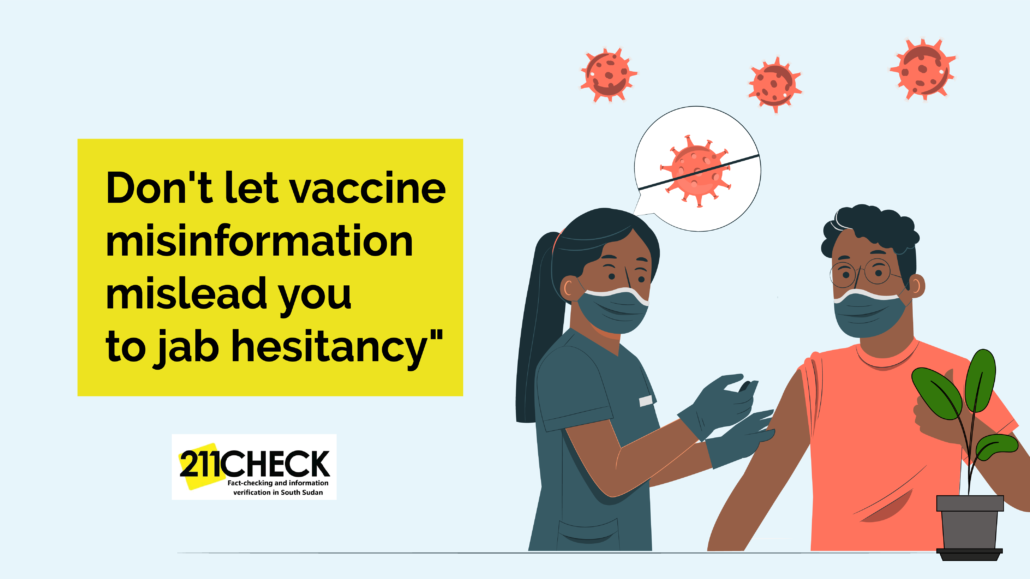The role of misinformation in aiding Covid-19 vaccine hesitancy in South Sudan
South Sudan recorded its first Covid-19 case on April 5, 2020, through a foreign national that travelled from the Netherlands via the Ethiopian Capital Addis Ababa, and then later to Juba.
After the announcement of the first case, health authorities and partners who anticipated the virus went to work. The team of united institutions created numerous programs aimed at sensitizing the public, in order to prevent and create responses to the virus.
It has been more than a year and a half since the proclamation was made, and efforts towards societal sensitization continue to shrink due to lack of funding.
Many of the state’s Covid-19 health facilities have been shut down, as a result of inadequate donor funding, according to the ministry of health – yet South Sudan, a country with fragile health infrastructure pumps 154,000 barrels of crude oil per day.
Vaccine Misinformation
In March this year, South Sudan received 132,000 doses of the AstraZeneca/Oxford vaccine from CoVAX – the global initiative to ensure lower-income countries have access to vaccines.
However, in May, the country initiated a process to return some of its vaccines after concluding it cannot administer the vaccines before they expire. Kenya immediately expressed interest to have the consignment of 72,000 vaccines.
On July 18, South Sudan’s second Covid-19 AstraZeneca vaccine consignment expired. This was after 56, 587 citizens got the vaccines.
According to the Ministry of Health Vaccination Report, Central Equatoria states led the highest vaccine consumption with 26, 195 South Sudanese vaccinated, Eastern Equatoria State followed with 3,073 immunized, while Jonglei State laid bottom with 1,788 total citizens vaccinated.
“The total number of South Sudanese below 56 years that took the vaccines is 5.72%, while a total of 94.28% personnel that took the jab are above the age 56.
“The total number of vaccines consumed from the first dose is 51,907, while 4,680 doses were consumed in the second dose” reads the report.
Since the vaccine arrival, the health authorities and partners initiated vaccine awareness programs which have largely been through mainstream media usage of Public Service Announcements (PSAs), talk shows, road drives etcetera – in a move to mobilize thousands to get the jab.
But the Health Ministry last month said at least 6,063 doses have been wasted in the 96 facilities of 35 counties, situated in 10 States across the country.
Why the low vaccine turn-up?
Kenyi Noel, a 33 old-year resident of Juba’s Gudele suburb says he has opted to stay without vaccination.
“If I get myself vaccinated and still get re-infected even after being inoculated, what does that mean? Secondly, I don’t need the vaccine because I am fine” said Kenyi. The World Health Organizations says, “Covid-19 vaccine does not prevent you from getting the virus but prevents the disease from getting into severity because the anti-bodies the vaccine induces are a defense mechanism that fight back and reduce the number of the viruses that may cause more hurt to you and also reduces hospitalizations’’.
Dr. Garang Anthony – acting chairman of South Sudan Doctors’ Union blames Kenyi’s statement on low vaccine information, mixed with misinformation, ‘Majority are afraid of the vaccine because of a lot of misinformation and dis-information”.
“Misinformation related to vaccines is rampant. People have the information but somewhere the information got distorted and they are confused whether they should go for the vaccination or abstain” Garang added.
Meanwhile, Lusuab Memo – Eye Radio veteran journalist who has been covering Covid-19 since its emergence in South Sudan says the continuous rejection of the jab is triggered by vaccine rumors.
“The kind of understanding people have certainly coils from what they hear and whether the information is actually from experts”.
“Some people created vaccine myths, because they have an underlying kind of attitude toward the general situation of the country like the economic crisis’’ said Memo who runs a weekly radio talk show on Covid-19.
With too much vaccine information being received, especially amongst those with access to the internet and social media – the dividing line between credible information and misinformation has become difficult.
“Malicious information driven by alternative media is also another contributing vaccine myths, especially done by individuals who sit in their houses and write to catch the attention of the person or want to sell their platforms’’ Memo added.
However, even with the rampant spread of vaccine misinformation, some people are still willing to get vaccinated. For instance, Juba’s Hai Mouna resident who preferred to be identified as Monica said she will still get the jab regardless of the myths.
“Naiveness towards the vaccine is uncalled for. I am determined to receive my jab as soon as the second bunch arrives” Monica revealed.
Above all, it is due to acknowledge that there has been an increased number of people coming for the jab witnessed by the exhaustion of the first bunch received.
As of July 30, South Sudan has recorded 11,049 cumulative cases of Covid-19, 118 deaths and 10, 099 recoveries.
The World Health Organization has urged South Sudan to ensure at least 10 percent of the population is vaccinated against coronavirus by September 2021.
Author: Dave Boboto – AFF Fellow – Cohort 3, edited by Garang Abraham and Eleanor Macheso.
NOTE: This article was produced as a result of partnership between DefyHateNow and Medaan, with support from Article19.
End…



Leave a Reply
Want to join the discussion?Feel free to contribute!